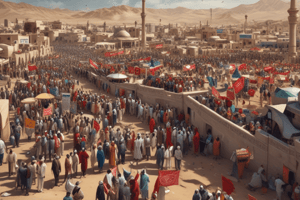Podcast
Questions and Answers
What was a common factor contributing to the legitimacy of the dictators in Egypt, Libya, and Tunisia before their downfall?
What was a common factor contributing to the legitimacy of the dictators in Egypt, Libya, and Tunisia before their downfall?
- Public support for the military
- Strong democratic traditions
- Long-standing oppressive regimes (correct)
- International diplomatic recognition
Which event characterized the fall of dictators in Egypt and Tunisia?
Which event characterized the fall of dictators in Egypt and Tunisia?
- Peaceful negotiations with foreign powers
- Massive public demonstrations (correct)
- Military intervention from neighboring countries
- Economic sanctions imposed by the UN
What is one of the primary criticisms of pluralism as a democratic theory?
What is one of the primary criticisms of pluralism as a democratic theory?
- It guarantees representation for all citizens.
- It encourages equal participation from all groups.
- It fails to adequately represent poor citizens. (correct)
- It always prioritizes the public interest.
How do totalitarian regimes differ from authoritarian governments?
How do totalitarian regimes differ from authoritarian governments?
What is a characteristic feature of a direct democracy?
What is a characteristic feature of a direct democracy?
What do critics argue about the decision-making process within interest groups under pluralism?
What do critics argue about the decision-making process within interest groups under pluralism?
What led to the downfall of Muammar Gaddafi in Libya?
What led to the downfall of Muammar Gaddafi in Libya?
What is political socialization primarily responsible for?
What is political socialization primarily responsible for?
Which of the following concepts is NOT considered fundamental to the American political culture?
Which of the following concepts is NOT considered fundamental to the American political culture?
Which statement best describes authoritarianism?
Which statement best describes authoritarianism?
What was a primary reason for the collapse of Egypt's new democracy in 2013?
What was a primary reason for the collapse of Egypt's new democracy in 2013?
What does the term 'dominant culture' refer to in the context of American politics?
What does the term 'dominant culture' refer to in the context of American politics?
Which two sources are considered the most important in political socialization?
Which two sources are considered the most important in political socialization?
Under what type of government does a dictator have ultimate control over all decisions in society?
Under what type of government does a dictator have ultimate control over all decisions in society?
Which historical roots have significantly influenced the dominant culture of American politics?
Which historical roots have significantly influenced the dominant culture of American politics?
What do the writers of the U.S. Constitution believe would sustain the nation?
What do the writers of the U.S. Constitution believe would sustain the nation?
What is a referendum?
What is a referendum?
What did the framers of the U.S. Constitution think about direct democracy?
What did the framers of the U.S. Constitution think about direct democracy?
What does a republic mean in the context of the U.S. government?
What does a republic mean in the context of the U.S. government?
How did the framers of the Constitution aim to limit direct influence of the electorate?
How did the framers of the Constitution aim to limit direct influence of the electorate?
What was one concern of the framers regarding ordinary citizens in the 1700s?
What was one concern of the framers regarding ordinary citizens in the 1700s?
What aspect of the U.S. government reflects the concept of popular sovereignty?
What aspect of the U.S. government reflects the concept of popular sovereignty?
What change to the election of senators was made later in U.S. history?
What change to the election of senators was made later in U.S. history?
What did the framers of the Constitution hope to achieve by creating an electoral college?
What did the framers of the Constitution hope to achieve by creating an electoral college?
How do modern conservatives primarily define liberty?
How do modern conservatives primarily define liberty?
What social issues were particularly affecting Trump's strongest support group?
What social issues were particularly affecting Trump's strongest support group?
What do conservatives generally believe about the private sector compared to the government?
What do conservatives generally believe about the private sector compared to the government?
Which political ideology advocates for strong government intervention to improve individual welfare?
Which political ideology advocates for strong government intervention to improve individual welfare?
Which social issue do modern conservatives tend to oppose?
Which social issue do modern conservatives tend to oppose?
What significant shift in liberalism occurred during the 1960s?
What significant shift in liberalism occurred during the 1960s?
What characterizes the political ideology of socialism?
What characterizes the political ideology of socialism?
How did the 2018 mid-term elections reflect the national response to Trump's presidency?
How did the 2018 mid-term elections reflect the national response to Trump's presidency?
What were some goals of American liberals in the early 20th century?
What were some goals of American liberals in the early 20th century?
What does the term 'political ideology' refer to?
What does the term 'political ideology' refer to?
Which of the following programs did the Roosevelt administration introduce?
Which of the following programs did the Roosevelt administration introduce?
Which group predominantly supported Trump during the election?
Which group predominantly supported Trump during the election?
What stance do liberals typically take on economic equality?
What stance do liberals typically take on economic equality?
How do Trump supporters relate to traditional conservatism?
How do Trump supporters relate to traditional conservatism?
Which ideology is characterized by skepticism or opposition towards most government activities?
Which ideology is characterized by skepticism or opposition towards most government activities?
What was a common sentiment expressed by Trump’s supporters after Hurricane Michael?
What was a common sentiment expressed by Trump’s supporters after Hurricane Michael?
Flashcards are hidden until you start studying
Study Notes
Events in Arab Nations since 2011
- Long-standing dictators in Egypt, Libya, and Tunisia faced growing opposition after decades in power.
- These nations lacked a tradition of democracy, allowing leaders to maintain legitimacy for extended periods.
- Legitimacy eroded due to oppressive actions; violence was used to suppress dissent.
- In Egypt and Tunisia, military refusal to enforce orders against demonstrators led to the fall of regimes.
- Muammar Gaddafi of Libya was overthrown and killed after a prolonged civil war lasting seven months.
- Egypt's brief democratic experiment ended in 2013 when the army regained control.
Types of Government
- Totalitarian Regimes: Governments that exercise total control over political, social, and economic life. Examples include Nazi Germany and the Soviet Union under Stalin.
- Authoritarianism: Governments where the ruler controls the government but allows some independence in social institutions.
- Democracy: Systems where political authority derives from the people. Can be divided into:
- Direct Democracy: Citizens directly decide on policies.
Concerns about Democracy
- Founders of the U.S. Constitution were wary of direct democracy due to its potential for instability.
- They believed ordinary citizens were often uneducated and susceptible to demagogues.
- James Madison cautioned against "pure democracy," advocating for a cautious approach to governance.
Democratic Republic
- U.S. system established a republic where power rests with the people, distinct from monarchy.
- Sovereignty is based on popular consent, with elections determining representatives.
- Senators were originally selected by state legislatures; later amendments allowed direct election.
- An electoral college was created to elect the president, intended to mitigate direct voter influence.
Challenges of Pluralism
- Pluralism may leave poor citizens underrepresented in interest groups, while affluent individuals may have too much influence.
- Critics argue that interest group struggles can hinder effective policymaking, leading to compromises that do not reflect the public interest.
Fundamental Values
- U.S. political culture is founded on liberty, equality, and property rights, with a consensus on these principles through political socialization.
- Key sources of political socialization include family and education systems.
- The concept of the dominant culture reflects Western European values influencing American politics, emphasizing individualism and private property.
Trump's Supporters
- Trump’s election was bolstered by dedicated Republican voters and new, previously non-voting demographics.
- Strong backing came from the white working class, facing social crises such as declining health and life expectancy.
Political Ideologies
- Ideology: A structured set of beliefs about human nature and governmental roles.
- Conservatism: Advocates for limited government intervention, traditional values, and cautious adaptation to change.
- Liberalism: Promotes governmental action to enhance individual welfare, civil rights, and tolerance for changes.
- Socialism: Aims for economic and social equality, often advocating for government or cooperative control over major industries.
- Libertarianism: Opposes most government involvement, favoring personal and economic freedoms.
Modern Conservative and Liberal Trends
- Conservatives value liberty but emphasize freedom from governmental interference in traditional matters.
- They typically oppose high government spending aimed at poverty alleviation.
- Modern liberalism has roots in early 20th-century policies, advocating for rights and welfare programs like Social Security.
- The civil rights and feminist movements of the 1960s reinforced liberalism's commitment to equality and government action against inequality.
Studying That Suits You
Use AI to generate personalized quizzes and flashcards to suit your learning preferences.




